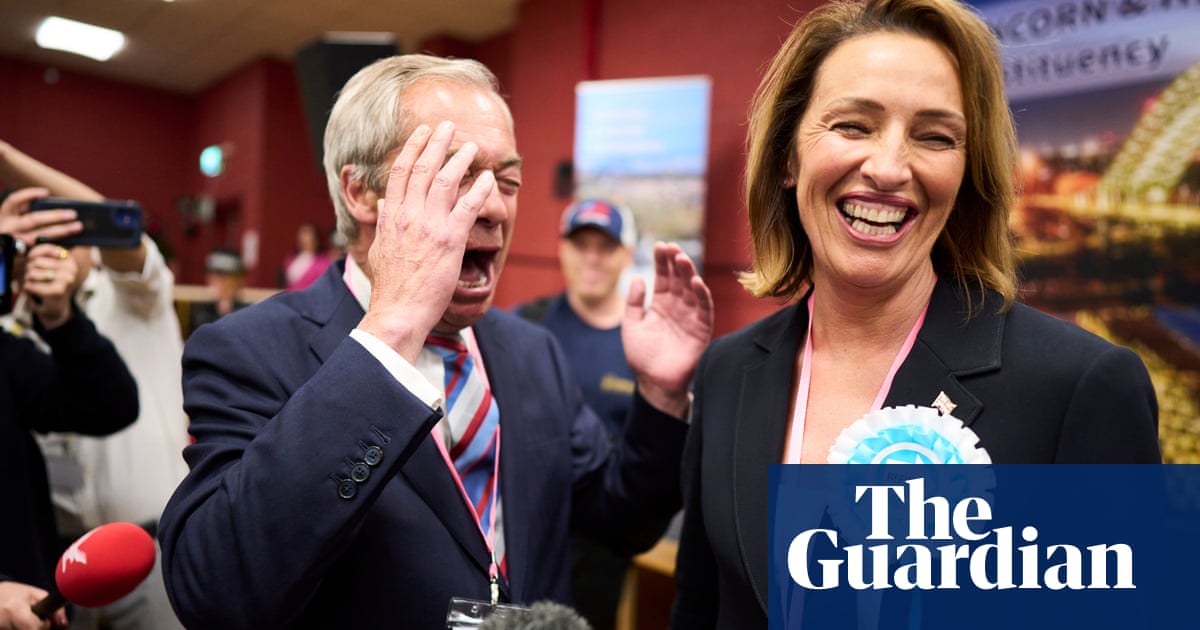For the last few months, Nigel Farage has been promising toprofessionalise his Reform UK party, saying its general election result of five seats had been hampered by the party’s “amateurism”.
Friday’snarrow victory in the Runcorn and Helsby byelectionsuggests his strategy is starting to bear fruit. Not only did the party win a seat in which it came a distant third less than a year ago, but it did so with a much bigger swing than implied by the national polls – demonstrating the effectiveness of the party’s ground campaign.
“Think about the swing,” Farage told Sky News in an interview minutes after the results were declared.
“Think about the change – this is heartland Labour party. Their vote has collapsed, and much of it’s come to us. That does away with the sort of media narrative that somehow it’s just us versus theConservatives. It’s not. This is a whole different politics,” he said.
Reform won Runcorn by just six votes: the narrowest byelection victory since 1945, and a result that will leaveLabourofficials wondering whether the prime minister should have visited the constituency during the campaign.
But to achieve that victory, the party had to overturn a majority of more than 14,000, with a swing of 17 percentage points from Labour. National polls, which put Reform ahead of Labour and the Conservatives, imply a swing of just 10 percentage points, which would not have been enough to win the seat.
The Reform candidate Andrea Jenkyns also became the first mayor of Greater Lincolnshire, winning with a majority of nearly 40,000 despite a campaignmarked by questionsabout how committed the Yorkshire-born former Tory MP was to her new county.
Reform endured more disappointing results in other mayoral elections, coming second best in Doncaster, North Tyneside and the West of England to Labour. But in each one voters swung heavily to Farage’s party. In North Tyneside, Reform lost by just 444 votes after a 26-point swing away from Labour.
Reform’s campaign was so extensive it triggered questions over the source of the party’s funding. TheLiberal Democrats calculatedthe populist party spent more than £2m on personalised letters to postal voters before yesterday’s elections – far more than the £281,000 it took in donations in the final quarter of last year.
Luke Tryl, the executive director of the political research organisation More in Common, said: “The question then is could Reform turn out those who don’t normally vote. The results from both the early council elections and Runcorn suggest they have managed just that.
“In Runcorn the party went up against Labour’s formidable get-out-the-vote machine and still managed to eke out the narrowest of wins. Among the many lessons from last night, one is very clearly the traditional main parties can no longer rely on Reform’s lack of infrastructure as a defence against Farage’s party’s advance.”
Sign up toHeadlines UK
Get the day’s headlines and highlights emailed direct to you every morning
after newsletter promotion
Labour was determined to put a brave face on the results, highlighting the unusual events that triggered the Runcorn byelection, which was called after the incumbent Labour MP Mike Amesburywas convictedof punching a constituent.
The party also pointed to stronger-than-expected showings in the three mayoral contests where it won, each of which it had been predicted to lose – suggesting that strong local candidates can still outperform the party’s national poll rating.
“It is very much a protest vote,” said the Labour peer Ayesha Hazarika. “But I think when we look across the results, it is very impressive that Labour’s managed to hold on to three of those mayoral seats.”
Meanwhile, the Conservative vote collapsed, as widely expected. In Runcorn, where Labour accused the Tories of giving up on the seat to allow Reform to win, the Tories dropped nine percentage points. In the West of England mayoral contest, which was fiercely contested by each of the five main parties, the party came fourth.
Tory officials tried to frame the elections as an early referendum on the Labour government. But the reality is both main parties are being hurt by the Reform surge.
The biggest question facing Farage is whether the drive to professionalise his party will be enough to keep the momentum building for the next four years.
